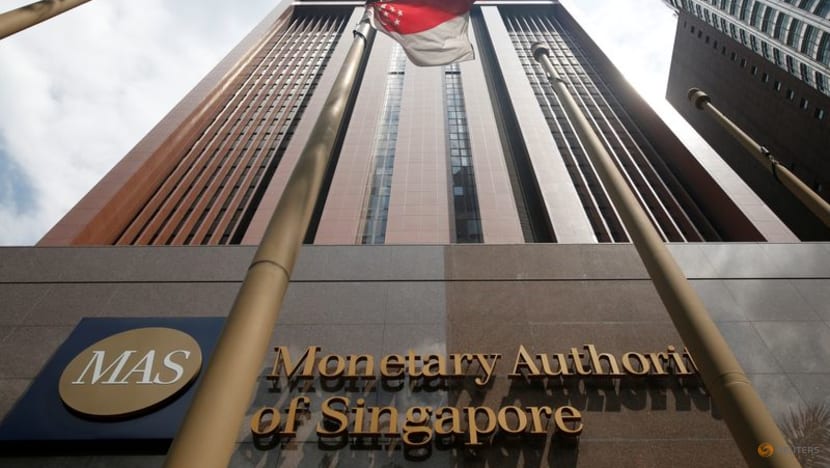MAS eases monetary policy for first time in nearly five years, lowers 2025 core inflation forecast
The last time the central bank eased monetary policy was in March 2020 when the country braced for a deep recession due to the COVID-19 pandemic.

FILE PHOTO: A view of the Monetary Authority of Singapore's headquarters in Singapore June 28, 2017. Picture taken June 28, 2017. REUTERS/Darren Whiteside/File Photo

This audio is generated by an AI tool.
SINGAPORE: The Monetary Authority of Singapore (MAS) has moved to loosen its monetary policy for the first time in nearly five years, amid expectations for slower growth and easing inflation in the year ahead.
In its January monetary policy statement released on Friday (Jan 24), the central bank said it will “reduce slightly” the slope of the Singapore dollar nominal effective exchange rate (S$NEER) policy band.
The width of the policy band and the level at which it is centred remained unchanged.
“This measured adjustment is consistent with a modest and gradual appreciation path of the S$NEER policy band that will ensure medium-term price stability,” the statement said, adding that it expects Singapore’s growth momentum to slow this year.
“MAS will closely monitor global and domestic economic developments, and remain vigilant to risks to inflation and growth.”
The central bank also lowered its forecasts for core inflation this year, noting that the key gauge for consumer prices has “moderated more quickly than expected and will remain below 2 per cent this year”.
Core inflation, which strips out private transport and accommodation costs, is expected to average between 1 and 2 per cent in 2025, down from an initial forecast of 1.5 to 2.5 per cent.
The revision comes a day after data showed core inflation touching a more than three-year low in December 2024. At 1.8 per cent, it was slightly lower than the 1.9 per cent in November.
In its statement, it said business cost- and demand-driven inflationary pressures are expected to remain contained. Imported costs should stay “moderate” on the back of expectations for global oil prices to decline and favourable conditions in key food commodity supplies.
“While an escalation of trade frictions could be inflationary for some economies, their impact on Singapore’s import prices is likely to be offset by the disinflationary drags exerted by weaker global demand,” it added.
Domestically, it expects consumer price inflation for essential services, such as public healthcare, pre-school education and public transport, to be “dampened by additional government subsidies”.
MAS kept its headline inflation for 2025 unchanged at a forecast range of 1.5 to 2.5 per cent, as accommodation inflation is “forecast to slow, partly offsetting an anticipated pickup in private transport inflation”.
On the economic front, it noted that global economic policy uncertainty has risen in recent months, “mainly reflecting expectations of increasing trade policy frictions”.
Amid other concerns such as a tightening of global financial conditions and a normalisation of manufacturing and trade activity after a period of frontloading, global growth could slow over the course of the year.
In Singapore, economic growth is projected to moderate, with the shifts in global trade policies possibly impacting the domestic manufacturing and trade-related services sectors, MAS said.
The central bank reiterated a forecast for the Singapore economy to expand at a slower pace of 1 to 3 per cent this year, slowing from a growth of 4 per cent last year.
“Overall, the outlook for Singapore’s growth and thus inflation remains subject to uncertainties in the external environment,” it said in its statement.
Ahead of the policy meeting, economists had been split on how the MAS would move, with half of those polled by Reuters anticipating no change. The other half expected a loosening in monetary policy.
Unlike most central banks that manage monetary policy through the interest rate, MAS manages monetary policy by letting the local dollar rise or fall against the currencies of the country’s main trading partners within the undisclosed S$NEER band.
It adjusts its policy by changing the slope, mid-point and width of the band.
MAS has kept monetary policy unchanged since a tightening in October 2022.
The last time it eased policy was in March 2020 when the country braced for a deep recession due to the COVID-19 pandemic.
















